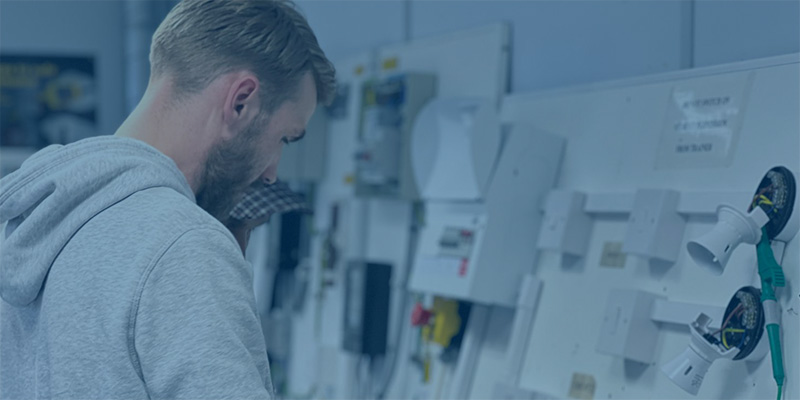
Representative example at 12 Months Interest Free Credit at 0% APR
£895
£89.5
£67.13
0%
Purchase price
Deposit
12 Monthly payment
Interest rate
Logic4training’s Part P training is a practical course designed for installers who carry out some electrical work, usually as a secondary role; such as wiring in a boiler, cooker or shower.
Part P Course Details
Kitchen fitters, plumbers, heating engineers and builders, all require some electrical tasks carried out as part of their job – wiring in a boiler, shower or cooker, for example. To do this safely and within the law, operatives need an understanding of Part P and the 18th Edition Wiring Regulations.
The Logic4training Domestic Electrical Installer (Part P) course, alongside the 18th Edition Wiring Regulations, can provide operatives with the practical skills, relevant knowledge to undertake this domestic electrical work.
Covering installation, safety, inspection, testing and certification (both Minor Works Certificates and Electrical Installation Certificates), trainees will learn which installations need notifying under Part P of the Building Regulations and the correct procedure for notification – direct to the Local Authority or through a Competent Persons Scheme.
The cost of the course includes training, assessment, the certification fee and a copy of the IET On-site Guide for BS7671:2018 18th Edition Wiring Regulations.
The Domestic Electrical Installer (Part P) course is suitable for operatives carrying out electrical installation work (whether full or part installation) within a domestic dwelling.
This can be as their primary occupation or for those who complete electrical work as a secondary task to their main role i.e. heating installers, bathroom and kitchen fitters and builders.
Anyone wishing to enrol on the Domestic Electrical Installer (Part P) course must hold the 18th Edition Wiring Regulations qualification as a mandatory prerequisite.
The Part P electrical course and assessment covers all the main competence areas required for domestic electrical installation, in-line with the latest edition of the 18th Edition Wiring Regulations.
This course is practical and focuses on installation, inspection, testing and certification on domestic electrical installations, and how to notify the installation (where required) under Part P of the Building Regulations – either direct to the Local Authority Building Control or through a Competent Person Scheme.
- Legislation and standards
- Definitions and basic principles
- Design specification and cable installation
- Special locations
- Notification and Competent Persons Schemes (CPS)
- Mains position and identification of system types
- Earthing and bonding
- Safety devices (identification, installation, replacement and testing)
- Safe isolation and working practice
- Installation, extension and additions to power and lighting circuits
- Installation and replacement of consumer units within a domestic installation
- Inspection, testing and certification (both Minor Works Certificates and Electrical Installation Certificates.)
The price of the course includes the IET Electrician’s Guide to Building Regulations and the IET On-Site Guide and these will be given to operatives during the course.
Visit our online shop for more electrical books here.
FAQs
Part P is a section of the Building Regulations for England and Wales that relates specifically to electrical safety in dwellings. It sets out the legal requirements for electrical installations in domestic properties to ensure they are designed, installed, inspected, and tested to minimise the risk of electrical shock, fire, and other hazards. Compliance with Part P is essential for protecting homeowners and meeting legal obligations.
Benefits include:
- Legal compliance for domestic electrical work
- Enhanced safety for you and your clients
- Ability to self-certify notifiable work
- Broader job opportunities and reduced reliance on subcontractors
- Improved professional reputation and customer trust.
Yes. Part P training is a basic requirement for joining a CPS, alongside the 18th Edition Wiring Regulations qualification and relevant experience. Membership of a CPS enables you to self-certify domestic electrical work and comply with legal requirements.
Part P certificates are generally valid for five years. It is recommended to refresh your knowledge and renew your qualification as part of your continuous professional development, especially when regulations are updated.
Notifiable work includes new installations, house re-wires, installation of new circuits, and additions to existing circuits in special locations (such as bathrooms and gardens). Minor works, like adding a spur or replacing a light fitting, are generally not notifiable. Notification is required unless the work is carried out by a registered electrician under a Competent Person Scheme. If you want to learn more about Electrical Installation Notifications, read our insight.
The Part P course is designed for those already working in a trade (such as heating engineers, plumbers or kitchen fitters) who need to carry out electrical work safely and legally. If you are new to the industry and want to train as a domestic electrician from scratch, our New Entrants Domestic Electrical Installer Course
is the better starting point.